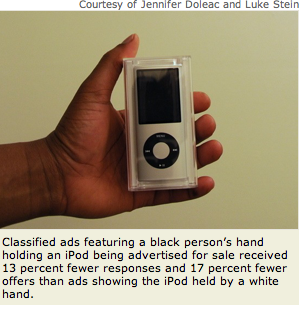Changing Racial Perceptions…It’s Up To You!
Unfavorable racial perceptions can be menacing. We should all be viewed as individuals. Changing unfavorable racial perceptions can be even more menacing as you don’t know what experiences a customer, or an employer has had. But… you can change perceptions, over time, in an effective way with this simple tactic. I do this column almost annually because you don’t have to go out of your way to change racial perceptions, you just have to do what you already do, and keep doing it. Read on….
__________
The role of any sales professional is challenging, even sometimes difficult. It is a role that comes with many contrasts for those who are Black. The perceptions that I am speaking of are racial perceptions, and they are a reality (because perceptions are reality) until they meet someone who starts to change them. These contrasts paint a picture that does not always work favorably for a Black professional.
The number of Black sales professionals is not representative of the number of Blacks in the workforce. Some of this was touched on in Black Sales Journal 1/31/11 – Why are There So Few Blacks in Sales?, yet there are so many reasons. There is one main reason:
There are concerns regarding whether white (or other) buyers would widely accept Black professionals in roles that have strong fiduciary and/or consultative duties.
It is difficult to recognize how many Black sales professionals leave their position before achieving their goals because they are not given an opportunity to show their worth.
Why am I Calling it Easy?
There is simplicity to changing perceptions. It involves a set of basic activities on the part of a large majority of the Black sales professionals and other Black employees that are in the market place. It does not require a revolution of any kind, and will gradually work to change the perceptions of so many in a positive way.
Note the following statement:
Each Black sales professional or other Black employee must ‘represent’ correctly…being the consummate professional showing exemplary performance in all aspects of manners, skills, and personal interactions. Being responsive beyond all others, and respectful of one’s time and efforts.
If that is done, we will all be well ahead of the game. As a matter of fact, if 80% of the Black professionals do this, we will begin to quickly and convincingly change perceptions. There is no doubt about it. This would be a game changer that would show the professionalism that a few bad performers could not tarnish.
There are many that will object to my premise. I understand some of their concerns. They will say “Why should I change anything when others in the majority do not necessarily change anything!” My response is simple “If it is what you need to do to be successful and make the living for yourself, and your family, it is worth the consideration, you should consider it.” If we do that, we can make a living, and also…. change perceptions.
There are times when you do all that is right and still don’t get the credit for “doing the right thing.” Here is an example of what happens when you do the right thing, yet are subject to perceptions.
Perceptions – An Example from My Past
This is an incident that I cited once before. I was a sales representative for a major insurance company in commercial business sales. I was young, and thought that I was on track to get somewhere, yet nothing was assured.
I was at a sales meeting, and was sitting at a table with the Divisional Sr. Vice President, who was someone that I had only seen a picture of in company publications. I don’t know why he sat at our table, yet we were all exhibiting our best manners.
During a lull in the meeting a sales associate of mine, who happened to be Black as well (there were 3 of us out of 62 sales professionals) began to criticize one of the local college basketball coaches. He was a venerable older coach who was not winning the big one but was respectable.
The SVP listened to us from behind his newspaper, and then slammed his had down on the table and said, “How dare you criticize him. One day you will be judged on your record, just like him, and you should hope you stand up to the criticism.” He went on to say, “If you two would stop reading the sports pages, and read the financial pages, one day maybe you will amount to something.”
I wanted to be rude in my response, but was calculated. It is unfortunate when someone is “judged” like that. He did not know either of us yet “played his card” by assuming that “all we read was the sports pages”.
To this day, there is nothing that has ever infuriated me like that comment. He did not know, but I was reading a lot more than the financial pages. Whether I did, or did not, it was not his business. We were merely having a conversation within his earshot. What is larger than that was the perception that we were absorbed in the sports pages, which was something that I seldom read then, and seldom read now.
He made that assumption based on his perception, and how categorically wrong it was. Needless to say, he was long retired before I was moved up in to a senior and executive management role, yet I have often relived how I should have reacted to him. When I reached and exceeded that level, I made sure that I respected our young professionals regardless of color and gave good constructive counsel without inserting my view of what they “must” be like.
Changing the View
You will not know how someone perceives you based on experiences and situations in their life. What you can do is to put your best foot forward, giving them the view of a professional who is prepared for the opportunity. We have discussed this type of professional many times in Black Sales Journal (Black Sales Journal 3/7/11- Be The Consummate Professional).
You change the landscape by being the professional that you ultimately are. You show that race and color have nothing to do with being a solid professional, and that you might have more pigmentation, yet the result will be the same or better.
Your comments are welcome.
 August 18, 2014
|
Posted by Admin9!
August 18, 2014
|
Posted by Admin9!

 Categories:
Categories:  Tags:
Tags: 


Your Comments